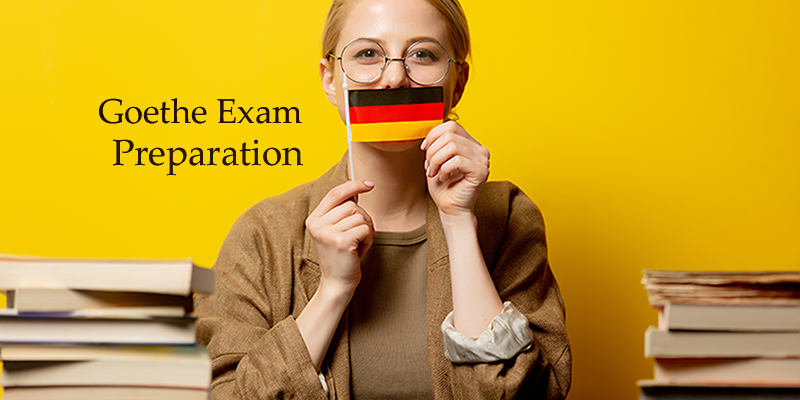Blog
Most Common Topics in the Goethe Exam
- February 9, 2025
- Posted by: siahpoosh
- Category: Germany

If you’re preparing for the Goethe-Institut exams, it’s essential to familiarize yourself with common topics that frequently appear in the different sections of the test. The Goethe exam assesses your German language skills at various levels (A1 to C2) and covers speaking, listening, reading, and writing. Understanding the most common themes can help you prepare effectively and feel more confident on exam day.
In this blog, we’ll explore the most frequently tested topics in the Goethe exam and provide useful tips to help you succeed.
1. Everyday Life (Alltagsleben)
This is one of the most common themes, especially for beginners (A1 & A2 levels). You may be asked to talk or write about daily routines, shopping, transportation, or leisure activities.
Example questions:
• A1: Wie sieht dein Tagesablauf aus? (What does your daily routine look like?)
• A2: Welche Verkehrsmittel benutzt du am häufigsten und warum? (Which means of transportation do you use most often and why?)
Tip: Learn basic verbs and phrases related to daily activities, such as aufstehen (to get up), einkaufen (to shop), kochen (to cook), arbeiten (to work).
2. Family and Relationships (Familie und Beziehungen)
At almost every level, you might be required to describe your family, relationships, or social life.
Example questions:
• A1: Beschreibe deine Familie. (Describe your family.)
• B1: Welche Rolle spielt die Familie in deinem Leben? (What role does family play in your life?)
Tip: Practice describing people, their characteristics, and relationships using adjectives like nett (kind), streng (strict), humorvoll (funny), zuverlässig (reliable).
3. Work and Career (Arbeit und Beruf)
For B1 and higher, topics related to jobs, career choices, and the work environment become more relevant.
Example questions:
• B1: Welchen Beruf möchtest du in der Zukunft ausüben? (Which profession would you like to have in the future?)
• B2: Wie wichtig ist Work-Life-Balance für dich? (How important is work-life balance for you?)
Tip: Learn job-related vocabulary and practice formal writing, such as emails, job applications, and CV writing in German.
4. Education and Learning (Bildung und Lernen)
Education is another recurring theme, especially at B1 and B2 levels. You might need to discuss your school experience, university studies, or opinions on the education system.
Example questions:
• B1: Welche Schulfächer hast du am meisten gemocht und warum? (Which school subjects did you like the most and why?)
• B2: Sollte das Schulsystem in deinem Land verbessert werden? (Should the school system in your country be improved?)
Tip: Practice using subjunctive forms like “Ich würde…” to express hypothetical situations.
5. Health and Lifestyle (Gesundheit und Lebensstil)
This is an essential topic, especially at B1 and B2 levels, where discussions about healthy living, diet, exercise, and mental health often appear.
Example questions:
• B1: Was machst du, um gesund zu bleiben? (What do you do to stay healthy?)
• B2: Welche Auswirkungen hat Stress auf die Gesundheit? (What effects does stress have on health?)
Tip: Learn health-related vocabulary like Ernährung (nutrition), Bewegung (exercise), Entspannung (relaxation), Schlafmangel (lack of sleep).
6. Travel and Tourism (Reisen und Tourismus)
Travel is a common theme in both speaking and writing sections of the Goethe exam. You may need to describe past trips, recommend destinations, or discuss travel preferences.
Example questions:
• A2: Wohin bist du letztes Jahr gereist? (Where did you travel last year?)
• B1: Welche Vorteile und Nachteile hat das Reisen? (What are the advantages and disadvantages of traveling?)
Tip: Practice using the Perfekt (past tense) and Konjunktiv II (subjunctive II) to talk about past trips and hypothetical travel situations.
7. Environment and Sustainability (Umwelt und Nachhaltigkeit)
At B2 and C1 levels, candidates are often asked to discuss climate change, renewable energy, and environmental protection.
Example questions:
• B2: Was können wir tun, um umweltfreundlicher zu leben? (What can we do to live more environmentally friendly?)
• C1: Ist der Klimawandel das größte Problem unserer Zeit? (Is climate change the biggest problem of our time?)
Tip: Learn phrases related to environmental issues, such as Klimawandel (climate change), erneuerbare Energien (renewable energy), Mülltrennung (waste separation), nachhaltiger Konsum (sustainable consumption).
8. Technology and Digitalization (Technologie und Digitalisierung)
With the rise of technology, topics related to the internet, social media, artificial intelligence, and digital transformation are becoming more common in the Goethe exam.
Example questions:
• B1: Welche Rolle spielen soziale Medien in deinem Leben? (What role does social media play in your life?)
• C1: Sind Roboter und künstliche Intelligenz eine Bedrohung für Arbeitsplätze? (Are robots and artificial intelligence a threat to jobs?)
Tip: Be prepared to express opinions using phrases like “Meiner Meinung nach…” (In my opinion…) or “Ich bin der Meinung, dass…” (I believe that…).
Final Tips for Success in the Goethe Exam
1. Expand Your Vocabulary: Learn words and phrases related to these common topics.
2. Practice Speaking: Try discussing these themes with a language partner or teacher.
3. Improve Writing Skills: Write short essays on these topics to practice structuring your arguments.
4. Listen to German Media: Watch news reports, podcasts, or videos to familiarize yourself with real-life discussions.
5. Stay Confident: Don’t worry about making mistakes. Examiners look for your ability to communicate effectively, not perfection.
At Siahpoosh Institute, we help students prepare for the Goethe exams by offering targeted lessons, exam strategies, and real practice materials. If you’re ready to take your German to the next level, join us today!
